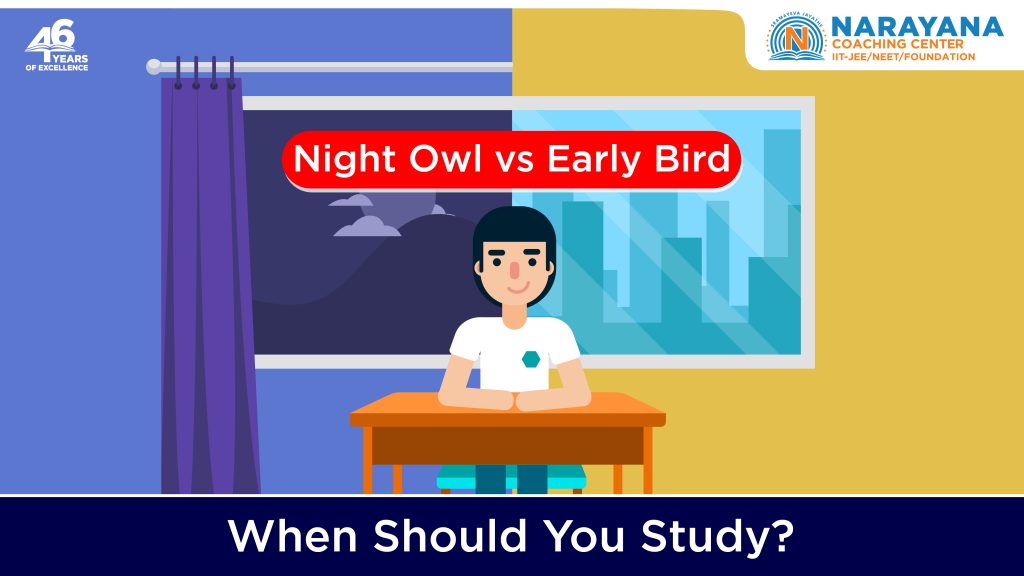
Preparing for competitive exams like JEE and NEET requires not just hard work, but smart strategy. One often-overlooked element is timing. Are you more focused at dawn or after dark? Should you study early like an “early bird” or grind late like a “night owl”? In this blog, we’ll help students of Classes 11 and 12 discover the most effective study time based on science, productivity, and personal rhythm.
Understanding Your Chronotype
What is a Chronotype?
A chronotype is your natural inclination toward being active at certain times of the day. It influences when you feel most alert or sleepy.
Types of Chronotypes
- Morning (Lark): Peak focus early in the day
- Evening (Owl): Most alert during nighttime
- Intermediate: Balance between both
Pros and Cons of Early Bird Studying
Benefits
- Fewer Distractions: Quiet mornings make for uninterrupted study.
- Better Alignment with School Schedules: Most classes are in the morning, syncing study time with learning hours.
- Increased Willpower: Morning energy is typically higher.
Challenges
- Tired Evenings: May struggle with stamina for revision at night
- Not Ideal for All Subjects: Analytical problem-solving may not be at its peak for all students in the morning
Pros and Cons of Night Owl Studying
Benefits
- Higher Creativity & Problem Solving: Some students experience peak cognitive function late at night.
- Peace and Silence: Ideal for deep focus without interruptions
- Flexible Timing: Great for personalized learning schedules
Challenges
- Can Disrupt Sleep Cycle: Poor sleep quality affects memory
- Mismatch with Exam Timings: Most competitive exams are in the morning
- Parental Restrictions: Not every student has permission to stay up late
Scientific Insights: When Is the Brain Most Active?
Studies show:
- Analytical tasks (like Math/Physics for JEE) are best done when your brain is most alert — usually within 2-4 hours of waking.
- Creative tasks (like understanding Biology diagrams or Chemistry reactions) can thrive later in the day.
How to Choose Your Ideal Study Time
Ask Yourself:
- When do I feel least distracted?
- When is my home environment quiet?
- Am I a quick starter in the morning or do I warm up as the day goes on?
Test It Out:
Try a 1-week trial:
- Week 1: Study from 5 AM to 9 AM
- Week 2: Study from 9 PM to 1 AM
- Evaluate productivity and energy
Syncing Study Time with JEE & NEET Demands
- Physics & Math (JEE): Tackle in high-focus periods (morning or early evening)
- Biology (NEET): Best during steady, low-stress hours
- Mock Tests: Always practice in morning slots to match real exam timings
Tips for Early Birds
- Get sunlight exposure early to boost alertness
- Avoid screens 1 hour before bed
- Fuel up with a light, protein-rich breakfast
Tips for Night Owls
- Use blue light filters to protect eyes
- Avoid caffeine past 6 PM
- Maintain a fixed wake-up time, even on weekends
Hybrid Approach: Best of Both Worlds
Many top performers study in two shifts:
- Morning: 6 AM to 9 AM (focus subjects)
- Evening: 6 PM to 10 PM (revision or practice)
This creates balance without exhausting either part of the day.
Real Student Examples
Ayesha, Class 12 NEET Aspirant:
“I thought I was a night owl until I started waking up at 5 AM. My scores improved because my brain was fresher in the morning.”
Rohan, Class 11 JEE Aspirant:
“Evening is my best time for deep math problems. I just make sure to get 8 hours of sleep no matter what.”
Conclusion
There is no “one-size-fits-all” when it comes to study schedules. The best time to study for JEE or NEET depends on your chronotype, subject load, and daily routine. Whether you’re an early bird or a night owl, the key is consistency, quality sleep, and aligning your prep with peak productivity hours.
FAQs
- Is it better to study at night or in the morning for JEE/NEET?
It depends on when you are most focused and least distracted. Both times can be effective if used wisely. - Will studying at night reduce my exam performance?
Not necessarily, but remember that JEE and NEET are morning exams, so practice mock tests in the morning. - Can I switch from being a night owl to an early bird?
Yes, with a gradual shift in sleep schedule and consistent routine. - Is 6 hours of sleep enough during JEE/NEET prep?
No. Aim for 7–9 hours to ensure proper memory retention and mental clarity. - How do I stay consistent with my study schedule?
Use planners, habit trackers, and reward systems to build consistency and motivation.
